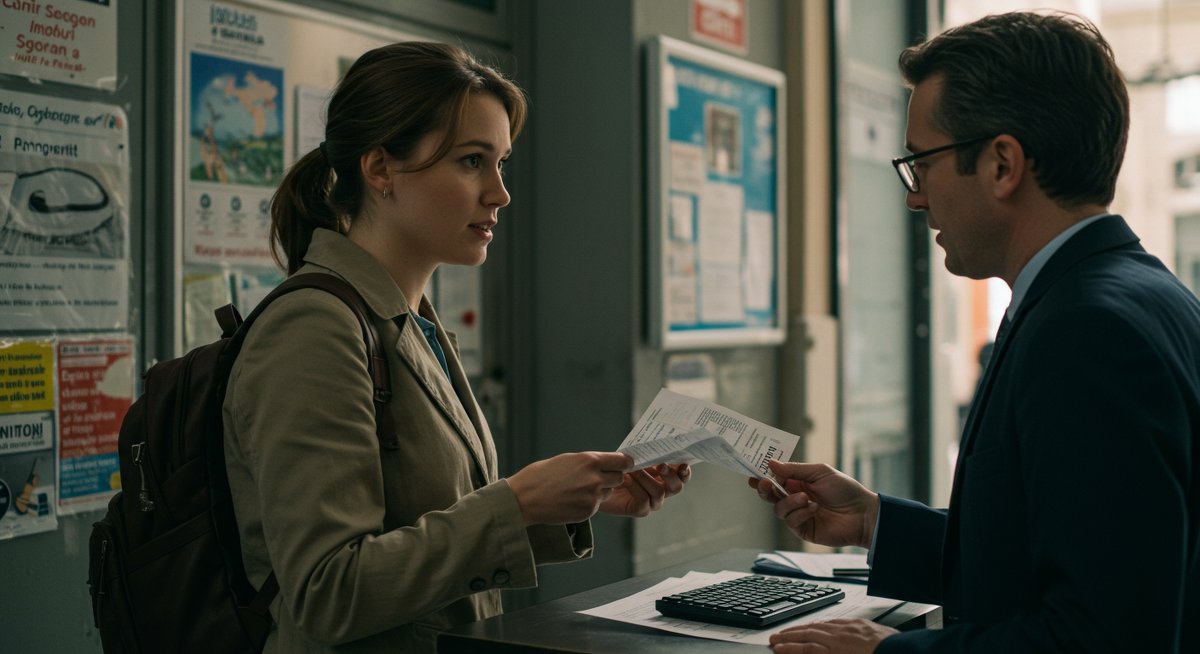Losing your passport, visa, or other essential travel documents while abroad is a major travel headache. It can lead to significant stress, delays, and unexpected costs. This guide provides a clear, step-by-step action plan, specifically tailored for budget-conscious international travelers. We'll cover how to report the loss, navigate emergency document replacement, and minimise financial impacts, ensuring you can continue your journey with as little disruption as possible.

The problem: What's really happening
Losing your documents can happen in a variety of ways – theft, misplacement, or damage. The immediate consequences include:
- Inability to travel: You may be denied boarding on flights or entry into countries.
- Financial loss: Replacing documents often involves fees, expedited services, and potential travel disruptions that increase costs (flights, accommodation, etc.).
- Time-consuming processes: Replacing documents takes time, and delays can derail travel plans.
- Identity theft risk: Stolen documents can lead to identity theft and other fraudulent activities.
Example 1: Passport theft in Rome
Imagine you’re a budget traveler in Rome, and your passport is stolen from your backpack at a crowded train station. Immediately, you can't access your pre-booked accommodation, your return flight is in jeopardy, and you face the daunting task of navigating a foreign bureaucracy. A replacement passport can cost upwards of $100 - $200, depending on the country and the need for expedited service, along with the cost of potential accommodation extensions if you have to wait for the replacement. This situation quickly escalates from an inconvenience to a significant financial burden, especially for travelers on a tight budget.
Example 2: Lost visa in Thailand
Consider another scenario: you're backpacking through Thailand, and your visa gets lost. You could be detained, fined, or even deported. This forces you to deal with immigration, which might mean paying fines (ranging from $50-$500, depending on the violation and the country) and incurring extra fees to get a new visa or emergency travel document. The travel disruptions can also be substantial, leading to missed tours and extra costs for changing plans.
Example 3: Damaged passport in Peru
You're trekking in Peru, and your passport gets damaged in a rainstorm. A damaged passport can prevent you from leaving the country. In this situation, you need to contact your embassy, provide supporting documentation, and potentially pay fees to get a new passport, potentially causing you to miss tours and other planned activities.
Common mistakes include delaying reporting the loss, panicking, and not knowing the correct steps, which could lead to more complex and expensive outcomes.
Why this affects international travelers
International travelers are particularly vulnerable. You are far from home, unfamiliar with local laws and customs, and potentially face language barriers. Emergency situations like these require immediate action, often in a foreign setting with limited resources. Furthermore, budget travelers are likely to have tighter financial margins. They are less able to absorb unexpected expenses, making a quick, affordable recovery plan crucial.
Root causes analysis
- Theft and Pickpocketing: Tourist hotspots are prime targets.
- Carelessness: Misplacing documents while rushing or in crowded areas.
- Natural Disasters: Floods, fires, or other events that destroy documents.
- Lack of Preparation: Not having copies or digital backups of documents.
- Insufficient Travel Insurance: Lack of coverage for lost documents or related expenses.
Step-by-step solution framework
Step 1: Immediate actions (first 24 hours)
- Report the Loss: Report the loss or theft to the local police immediately. Get a written police report. This is essential for any subsequent claims or document replacement. If you're in a country where you do not speak the local language, try to find an officer who speaks your language or use a translation app.
- Contact Your Embassy/Consulate: Locate the nearest embassy or consulate of your home country. Report the loss and follow their instructions. They can provide guidance and begin the process of issuing an emergency passport or other travel documents.
- Cancel Credit Cards: Contact your banks immediately to cancel any credit or debit cards that were stolen or may be at risk. This protects you from fraudulent charges.
Step 2: Document replacement
- Emergency Passport/Travel Document: Work with your embassy/consulate to obtain an emergency passport or a temporary travel document. The exact process and requirements vary by country.
- Required Documentation: Gather all necessary documents: police report, photo ID, a copy of your lost passport (if you have one), and any other documentation requested by the embassy or consulate. Be prepared to provide proof of citizenship.
- Photos: Prepare passport photos, as they're usually required. If you do not have these, ask the consulate about local options.
Step 3: Minimising financial impact
- Travel Insurance: Contact your travel insurance provider immediately to file a claim. They may cover replacement costs, accommodation, and other expenses related to the loss. However, be sure to carefully review your policy as some policies have restrictions.
- Emergency Funds: If you have an emergency fund (highly recommended for budget travelers), use it to cover immediate expenses such as accommodation, food, and transportation. If you are running low on funds, contact your embassy or consulate for assistance.
- Replacement Fees: Inquire about the cost of the replacement passport or travel document, and explore options for payment. Consider expedited services, but compare the costs.
Step 4: Planning your return/continued travel
- Flights and Accommodation: Adjust your travel plans. Book new flights and accommodation if the replacements and the emergency situations caused you to miss them. Make sure to keep copies of your bookings.
- Visa Requirements: If you have lost your visa, check the process for obtaining a new visa or extending your stay legally. In some cases, you will need to leave the country and reapply.
- Staying Safe: Remain vigilant and avoid carrying all important documents together in one place.
Prevention strategies
- Make Copies: Create both physical and digital copies (scans or photos on your phone) of your passport, visas, and other important documents. Store the digital copies securely (cloud storage or encrypted email) and keep physical copies separate from the originals.
- Secure Your Documents: Use a money belt or secure pouch to carry your passport and other essential documents. Avoid carrying all your documents in the same place.
- Emergency Contacts: Keep a list of emergency contacts, including your embassy/consulate, travel insurance provider, and credit card companies.
- Travel Insurance: Get travel insurance that covers lost documents, theft, and medical emergencies. Review the policy details to ensure coverage.
- Registration: Register your trip with your embassy. Most countries offer this service to help them locate their citizens in an emergency.

When to seek professional help
- When dealing with complex visa issues: If you have lost your visa and are facing challenges with immigration authorities, seek assistance from a legal expert specialising in international travel law.
- If you're a victim of identity theft: If your passport or other documents were stolen and you suspect identity theft, contact your local police and credit reporting agencies immediately.
- When your travel insurance claim is denied: If your travel insurance claim is denied or not adequately covered, consider seeking legal advice.
International legal protections
- Consular Assistance: Your embassy or consulate is obligated to provide assistance, including helping you obtain a new passport or travel document. They can also help you contact family and friends.
- Local Laws and Rights: Familiarise yourself with local laws and regulations regarding lost or stolen documents. Be aware of your rights in the event of theft or loss.
- Travel Insurance Coverage: Understand the coverage provided by your travel insurance policy. Ensure you are aware of the policy's terms and conditions.
Your action checklist
- Report to Police: Obtain a police report immediately.
- Contact Embassy/Consulate: Report the loss and follow their guidance.
- Cancel Cards: Cancel lost or stolen credit cards and debit cards.
- Gather Documentation: Collect all necessary documents for replacement.
- File Insurance Claim: Contact your travel insurance provider.
- Obtain Replacement: Secure an emergency passport or travel document.
- Adjust Travel Plans: Make necessary adjustments to your itinerary.
- Stay Safe: Remain vigilant and protect your remaining belongings.
Next steps in your travel journey
After dealing with a lost document, it is important to remain calm and focus on what to do next. With the replacement passport or travel document, you can continue your trip. Make sure to follow through on all of the above, and keep copies of all documentation. Safe travels!